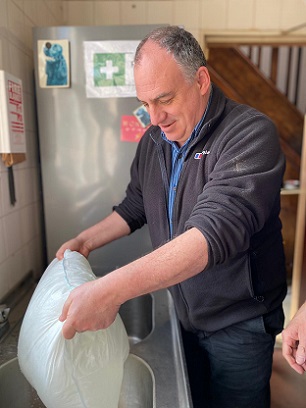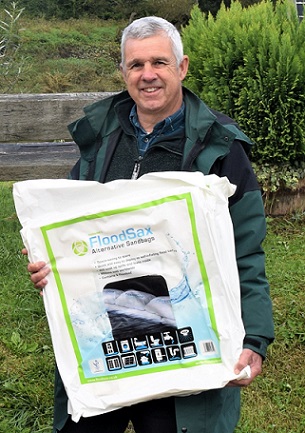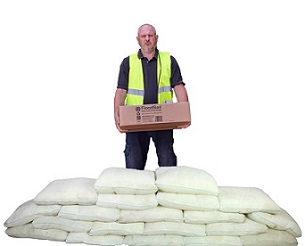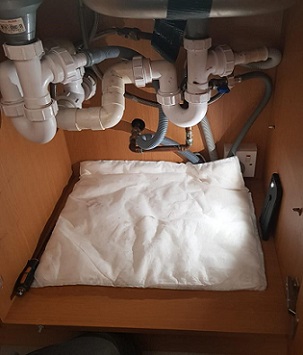 Prominent Green councillor Andrew Cooper testing out a FloodSax alternative sandbag to see for himself how well they work
Prominent Green councillor Andrew Cooper testing out a FloodSax alternative sandbag to see for himself how well they work
 Forest of Dean District Council Cabinet member for the environment Clr Sid Phelps with a pack of 5 FloodSax alternative sandbags
Forest of Dean District Council Cabinet member for the environment Clr Sid Phelps with a pack of 5 FloodSax alternative sandbags
 All these 20 FloodSax came from this one easy-to-carry box
All these 20 FloodSax came from this one easy-to-carry box
 FloodSax are great at absorbing leaks and internal floods in hard-to-reach places
FloodSax are great at absorbing leaks and internal floods in hard-to-reach places
More councils now relying on FloodSax sandless sandbags as environmentally friendly alternative to traditional sandbags
An increasing number of councils nationwide are now turning to FloodSax alternative sandbags as a greener and more reliable alternative to traditional sandbags.
These award-winning sandless sandbags take up far less storage space, have a long shelf-life and can be quickly and easily deployed during emergencies.
They can save an incredible amount of money in water damage and the human misery of flooding. According to the Association of British Insurers the average claim for a flooded business is £70,000 while the average cost of a flooding claim on home insurance is around £32,000.
FloodSax, which are largely biodegradable after use, have the backing of a prominent Green councillor from the north of England. Huddersfield-based Clr Andrew Cooper has stood for deputy leadership of the Green Party, is the Green Party’s regional campaigns co-ordinator for Yorkshire and sits on Kirklees Council which covers Huddersfield and Dewsbury.
He discovered FloodSax which are made by Huddersfield-based company Environmental Defence Systems Ltd when parts of his ward became badly flooded and he was unable to get any sandbags from the council at short notice.
Clr Cooper said: “It means we can get FloodSax distributed quickly to people who need them most in an emergency.”
One of the UK’s most prominent flood campaigners, Mary Dhonau, hates sandbags with a passion and now promotes FloodSax wherever she goes.
She said: “When a flood happens everyone shouts for sandbags but they simply don’t work. They are also heavy, unsustainable and environmentally unfriendly. Sand escaping from sandbags can block drains too, making the potential for floods to be worse the next time.
“Sandbags do more harm than good and it frustrates and upsets me to see them continually being used as a go-to solution when they don’t work.”
Dozens of local authorities countrywide now use FloodSax so they are prepared for flooding emergencies day or night.
Although local authorities don’t have a responsibility to provide sandbags, many recognise that taxpayers will turn to them for help when flooding is imminent and so have made sure they have stocks of FloodSax for times of crisis.
Adur and Worthing Councils in West Sussex say: “The Environment Agency now says that anti-flood devices like FloodSax are the way forward for people to protect their homes.”
Gosport Borough Council in Hampshire urges its residents to use FloodSax, saying it has evaluated the bags. The council adds: “FloodSax have many advantages over traditional sandbags, being easy to store and move, easy to use and, importantly, easy on the environment, having a significantly lower carbon footprint.”
Derbyshire County Council adds: “The county council has a limited supply of FloodSax and these can be provided to members of the public considered to be at risk of flooding for demonstration purposes only. Therefore, the county council recommends residents source their own additional FloodSax should they find that the product works for them.”
Forest of Dean District Council based at Coleford in Gloucestershire has hundreds of FloodSax after the area was badly hit by flooding just before Christmas 2020.
Forward-thinking South Bucks District Council has provided FloodSax to people and businesses in a bid to save them from the misery of flooding and also keeps a stock in case of emergencies.
But it warns: “If your home is at risk from flooding please take your own precautions. Remember, it is your responsibility to look after yourself and your property. FloodSax are a useful alternative to sandbags and have been made available to some individuals and communities. They are lightweight and absorb water in situ.”
Lancaster City Council states: “There are some new and innovative alternatives to sandbags which react with water to provide the same or better defence but are much easier to store and will have a longer lifespan. Search ‘sandbag alternatives’ on an internet search engine to find such products.
“The council does not have sandbags available to meet requests from individual members of public as our reserve supply is needed in case we are directed to distribute them by the emergency services.”
Environmental Defence Systems Ltd managing director Richard Bailey said: “We have seen a big upsurge in councils wanting FloodSax, especially London boroughs in the wake of two summers when the capital has been badly flooded by flash floods.
“Although the weather has been dry, the potential for flooding is always there, especially when the ground is so hard due to a lack of rain. When the rains and autumn storms arrive it’s expected to lead to flash flooding. Councils know this and are getting prepared now.”
In their dry state FloodSax have a large and very flat surface area so are ideal at soaking up leaks, spills and floods inside homes and businesses, especially in hard-to-reach places such as beneath pipes and under kitchen sinks.
Almost 3 million FloodSax have now been sold worldwide.